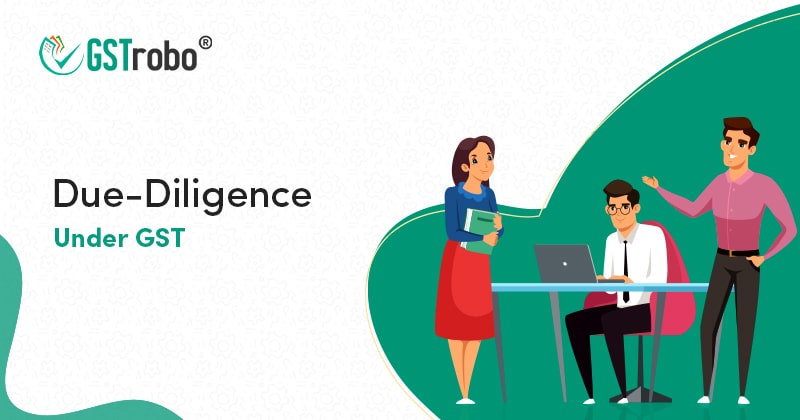Due-Diligence under GST
Conducting due diligence before entering into a contract or transaction with another party is vital. The information gathered throughout the due diligence process might benefit both parties since it reveals several key variables. We’ll look into Due Diligence under GST in this article.

Meaning of Due Diligence
It is the process of conducting a study and analysis before making a purchase, making an investment, forming a business partnership, or taking out a bank loan. Due Diligence examines an entity’s commercial potential as well as its financial viability in terms of assets and liabilities.
Purpose of Due Diligence
Due diligence can help you reach the following goal:
- Due diligence helps in knowing everything about an enterprise such as success, strengths, and possible risks (if any).
- It also highlights concerns that might be addressed during the valuation.
How is Due diligence Carried out?
The following is the due diligence procedure:
- The consumer is first consulted, which aids in the understanding of the planned transaction.
- The extent of work and technique are then assessed;
- The target company’s necessary papers and information are gathered;
- After obtaining the papers and the documents required, the following step is to write down any important information from those documents.
- Any additional document or piece of information might be requested;
- Following that, a due diligence report is created;
- After all of the chapters of the due diligence report have been written, an executive summary is created, which includes the substance of the Due Diligence transaction’s important findings. The report is written in great depth, including all of the regulations, compliances, and risks.
Role of Due Diligence under GST
Every taxpayer is obliged by the GST Act to keep books of accounts, invoices, and other documents, as well as to file GSTR on time. GST due diligence aids in determining if enterprises have complied with GST regulations. To undertake GST due diligence, first, gain a thorough understanding of the company’s operations. Examine your accounting records while bearing in mind your GST requirements. The GST diligence professionals assist clients in reviewing and comparing their GSTR 3B filings with GSTR 1. Experts make sure the company is GST compliant.
Due diligence professionals examine and verify invoices to ensure that the tax is accurately imposed. To prevent interest and penalty, transactions linked to the place of supply and the time of supply are measured precisely.
Checks are made on delivery of goods/services, receipt of tax invoices, payment of GST, filing of GSTR, and so on.
Due to the complexity and ambiguity of the GST law, many businesses suffer as a result of mistakes made in the assessment and other compliances. As a result, several large-scale businesses and service providers regard indirect tax due diligence as a worthwhile endeavor.
Due diligence for GST includes a review of the previous three annual returns, a reconciliation of financials with supplied returns, a review of a prior due diligence report, and a check of the completeness and accuracy of GST tax filings.
Apart from the compliance assessment, due diligence should also verify that management is up to date on changes in law and understands the consequences of non-compliance.
Important Questions to Ponder While Forming Due Diligence under GST
Even though an expert may conduct a complete examination of GST compliances, the following inquiries should never be avoided:
- If GST returns were filed on time?
- If all GST compliance requirements been met?
- If the GST department issued any notices?
- Is ITC claimed in compliance with GST regulations?
Conclusion
GST due diligence assists you in making intelligent decisions and gives a report on which you may plan your future activities. The Due Diligence report not only lists the problems but also their resolutions, allowing the taxpayer to make more informed decisions. As a result, the value of due diligence has grown over time. As a result, GST due diligence can be extremely beneficial, as it helps in determining if financial information and records under GST have been kept accurately and as per prescribed GST law.
